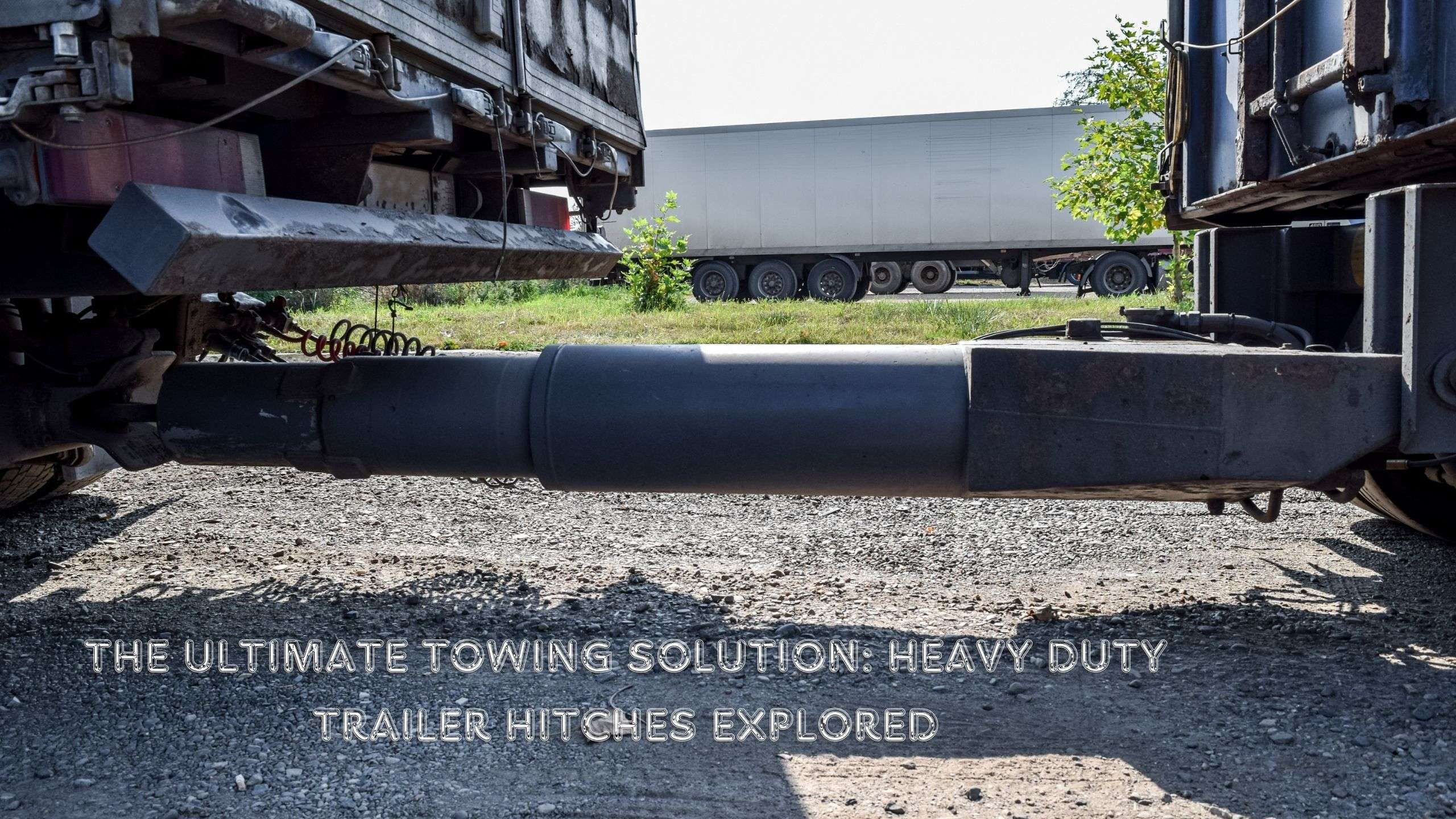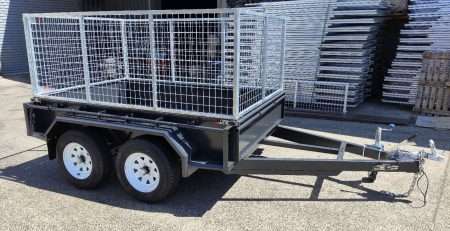
The Ultimate Towing Solution: Heavy Duty Trailer Hitches Explored
Understanding Heavy Duty Trailer Hitches
Before diving into the specifics of heavy-duty trailer hitches, it’s crucial to understand what makes them different from standard trailer hitches. In essence, heavy-duty hitches are built to handle larger loads and provide more stability, making them an optimal choice for towing trailers, RVs, and other heavy equipment (CURT Manufacturing).
Importance of Heavy Duty Hitches
Heavy-duty trailer hitches play an integral part in safely and efficiently towing heavy loads (Titan Worldwide). Their design and material ensure they can withstand substantial stress and strain. In many cases, these hitches come with built-in weight distribution systems, which help evenly distribute the weight of the trailer across the tow vehicle for better control and stability.
It’s also worth mentioning that heavy-duty hitches are typically made from high-strength steel and undergo rigors testing to ensure durability and safety (CURT Manufacturing). This robust construction and attention to detail make heavy-duty hitches a reliable choice when towing large and heavy loads.
Types of Heavy Duty Hitches
Heavy-duty trailer hitches can be categorised into different classes, such as Class 4, Class 5, and Class 6, each with their own weight capacity and compatibility with certain vehicles (Titan Worldwide).
For instance, receiver-style hitches are the most common type of heavy-duty trailer hitches, with a square receiver tube that can accommodate different types of hitch-mounted accessories (CURT Manufacturing).
Weight capacities vary, ranging from Class 3 hitches that can handle up to 6,000 pounds of gross trailer weight to Class 5 hitches that can handle up to 20,000 pounds of gross trailer weight.
| Hitch Class | Weight Capacity |
|---|---|
| Class 3 | Up to 6,000 lbs |
| Class 4 | Up to 10,000 lbs |
| Class 5 | Up to 20,000 lbs |
Choosing the right hitch class and type depends on your specific towing needs and the towing capacity of your vehicle. As we delve deeper into the topic of heavy-duty trailer hitches, we’ll provide more detailed guidance on how to select the right hitch for your vehicle.
Classification of Trailer Hitches
In the world of towing, hitches are far from being one-size-fits-all. Trailer hitches are classified based on their weight capacity, enabling users to safely and effectively tow a variety of loads. Understanding these classifications can help you select the right hitch for your specific needs.
Class-Based Categories
Trailer hitches are categorised into different classes, primarily based on their towing capacity. Class IV and Class V hitches fall into the category of heavy-duty trailer hitches, designed to tow the heaviest loads (Weigh Safe).
Apart from these, there are other classes of trailer hitches as well. Class I hitches are designed for lighter loads, while the weight capacity increases progressively with each class. It’s important to note that the right class of hitch depends not only on the weight of the trailer but also on the towing capacity of your vehicle.
Weight Capacities of Hitches
The weight capacity of a hitch is one of the key factors that determines its class. Class 3 hitches, for instance, can handle up to 6,000 pounds of gross trailer weight. On the other end of the spectrum, Class 5 hitches can handle up to 20,000 pounds of gross trailer weight (CURT Manufacturing).
Here’s a quick look at the weight capacities of different classes of receiver hitches:
| Class | Weight Capacity |
|---|---|
| Class I | Up to 2,000 lbs |
| Class II | Up to 3,500 lbs |
| Class III | Up to 6,000 lbs |
| Class IV | Up to 10,000 lbs |
| Class V | Up to 20,000 lbs |
Figures courtesy CURT Manufacturing
By understanding the classification and weight capacities of heavy-duty trailer hitches, you can make an informed decision about which hitch is right for your towing needs. Be sure to consider the towing capacity of your vehicle as well as the weight of the trailer and its load. And remember, safety should always be your top priority when towing.
Selecting the Right Trailer Hitch
Choosing the appropriate trailer hitch for your needs is not as simple as picking the one that looks the most sturdy. There are several factors that need to be taken into account to ensure safe and efficient towing.
Considering the vehicle’s towing capacity
The first step in selecting the right heavy-duty trailer hitch is to consider the towing capacity of your vehicle. This is determined by factors such as the vehicle’s gross vehicle weight rating (GVWR) and the hitch’s class rating. The towing capacity refers to the maximum weight that your vehicle can safely tow without causing damage or compromising safety.
This information can usually be found in the vehicle’s owner’s manual. If you’re unsure, it’s recommended to consult with a professional to determine the appropriate heavy-duty trailer hitch for your specific towing application (Weigh Safe). Overloading your vehicle can lead to serious issues such as brake failure, transmission damage, or even a complete breakdown, so it’s crucial to make sure your vehicle is capable of handling the weight of your trailer and load.
Assessing the Trailer and Load
In addition to considering your vehicle’s towing capacity, you also need to evaluate the weight of the trailer and any additional cargo or equipment being towed (Weigh Safe). The combined weight of the trailer and load should not exceed the towing capacity of your vehicle or the hitch.
This includes any trailer brake controllers, trailer lights and wiring, trailer safety chains, and other accessories that may be attached to the trailer. If you frequently tow different types of loads, you might want to consider a hitch with a higher weight rating to provide flexibility for various towing needs.
Choosing the right heavy-duty trailer hitch involves a careful assessment of your vehicle’s capabilities and the demands of your trailer and load. This ensures compatibility and safe towing, helping to prevent potential towing-related accidents and damage to your vehicle. Always remember, when it comes to towing, safety should always be your foremost concern.
Construction and Material of Hitches
Critical to the performance and longevity of heavy-duty trailer hitches is their construction and the materials used in their manufacture.
Durability of Heavy-Duty Hitches
When it comes to heavy-duty towing, the durability of the trailer hitch is paramount. The ability to handle larger loads and provide increased towing capacity is a key factor that sets heavy-duty trailer hitches apart. They are designed to tow trailers, RVs, and other heavy equipment, ensuring that they can withstand the demands of heavy towing applications (CURT Manufacturing).
Not only does the hitch need to be strong, but it also needs to be able to endure the elements and the wear and tear of regular use. The durability of a hitch is often tested under rigors conditions to ensure that it can withstand the stresses of towing heavy loads over long distances.
Material Used in Hitches
Heavy-duty trailer hitches are typically made from high-strength materials that provide the necessary stability and safety for towing activities. The most common materials used in the construction of these hitches are steel and aluminium.
Steel is a popular choice due to its strength and durability. It’s capable of withstanding heavy loads, making it suitable for heavy-duty towing applications. On the other hand, aluminium, while lighter than steel, is also a durable material that can handle heavy loads.
| Material | Advantages |
|---|---|
| Steel | High-strength, durable, and suitable for heavy loads |
| Aluminium | Lightweight, durable, and resistant to corrosion |
The construction and material of the hitch are key factors to consider when choosing a trailer hitch. However, it’s also essential to consider other elements, such as the vehicle’s towing capacity and the weight of the trailer and load. In conjunction, these factors will help you choose the right heavy-duty trailer hitch for your needs.
Remember, maintaining your hitch is just as important as choosing the right one. Regular maintenance can prolong the life of your hitch and ensure safe towing. For more information on maintenance and safety tips, refer to our section on Maintenance and Safety Tips.
Installation of Heavy Duty Hitches
Once you have selected the right hitch for your needs, the next step is the installation process. Installing heavy-duty trailer hitches involves several important steps and considerations to ensure safe and efficient towing.
Professional Installation
Heavy-duty trailer hitches typically require professional installation to ensure proper fitment and secure attachment to the vehicle’s frame. This is crucial for maintaining the stability and safety of your trailer while it’s being towed.
Professionals have the tools and expertise necessary to correctly install the hitch, minimising the risk of damage to your vehicle or the hitch itself. They will also be able to guide you on the best practices for using and maintaining your hitch, ensuring its longevity and optimal performance.
Remember, while the initial cost of professional installation may seem high, it’s an investment in the safety and effectiveness of your towing equipment. It could potentially save you from expensive repairs or replacements in the future due to improper installation.
Vehicle-Specific Mounting
Heavy-duty trailer hitches can be installed on a variety of vehicles, including trucks, SUVs, and vans, by using vehicle-specific mounting brackets and hardware. This ensures a perfect fit and secure attachment, which is essential for safe towing.
When considering vehicle-specific mounting, it’s recommended to consult with a professional or refer to the vehicle’s owner’s manual. This will help determine the appropriate heavy-duty trailer hitch for your specific towing application and vehicle type.
In the end, the successful installation of heavy-duty trailer hitches is the culmination of careful consideration of your vehicle’s towing capacity, a thorough understanding of the weight of your trailer, and an assessment of the type of towing you will be doing. By investing time in these factors, you can ensure a safe and efficient towing experience.
Remember, along with your hitch, there are other accessories and components you might need for an optimal towing experience. These include trailer hitch locks, trailer brake controllers, trailer lights and wiring, and trailer safety chains, amongst others.
Maintenance and safety tips
Maintaining and using heavy-duty trailer hitches responsibly is crucial for ensuring their optimal performance and safety. Here, we delve into the regular maintenance of hitches and the safety measures for towing.
Regular Maintenance of Hitches
Regular maintenance of heavy-duty trailer hitches is vital to ensuring their optimal performance and safety. This includes inspecting the hitch for signs of wear or damage, lubricating moving parts, and tightening any loose bolts or connections. We recommend checking the hitch ball and coupler for signs of wear or damage, such as cracks or excessive wear on the ball surface. If you observe any issues, the hitch ball or coupler should be replaced immediately to prevent towing accidents.
Furthermore, it’s important to regularly inspect and maintain the electrical connections between the tow vehicle and the trailer. This includes examining the wiring harness, connectors, and lights to ensure proper function. Any damaged or faulty components should be promptly repaired or replaced.
Safety Measures for Towing
When towing with a heavy-duty trailer hitch, safety should always be a priority. Safety chains should always be used when towing. These chains provide an additional level of security in case the trailer disconnects from the hitch. The chains should be crossed under the trailer tongue to prevent it from dropping to the ground in the event of a hitch failure.
In addition, proper weight distribution is crucial when towing with a heavy-duty trailer hitch. Utilizing a weight distribution system can help achieve this by evenly distributing the weight across the tow vehicle and trailer axles, increasing stability and control.
Always adhere to the manufacturer’s guidelines and recommendations for the specific heavy-duty trailer hitch being used. This includes adhering to the hitch’s weight capacity, installation instructions, and any additional safety precautions outlined by the manufacturer.
Before embarking on each towing journey, perform a pre-trip inspection. This includes checking the hitch, trailer, and towing vehicle for any signs of damage or wear, ensuring all connections are secure, and verifying that all lights and signals are functioning properly.
And of course, when towing with a heavy-duty trailer hitch, always drive at a safe and appropriate speed, allowing for increased stopping distances and manoeuvring capabilities. Be aware of the trailer’s size and weight, as it may affect the vehicle’s handling and braking performance. Maintain a safe distance from other vehicles on the road and use caution when changing lanes or merging.
Finally, be aware of the specific towing laws and regulations in your area, including speed limits, weight restrictions, and any additional requirements for towing with a heavy-duty trailer hitch. Adhering to these laws will help ensure your safety and the safety of others on the road.
Remember, prioritising regular maintenance and safety can ensure a smooth and hassle-free towing experience with your heavy-duty trailer hitches. If you need more information on towing safety or maintenance, feel free to explore our range of articles on trailer hitch locks, trailer brake controllers, and trailer wheel bearings.
Author
I am Rahatul Ashiq Tamal. Another author of Muscle Trailers. Muscle Trailers is a well-known trailer brand in Sydney, Melbourne & Adelaide

How to Mount a Spare Tire on Your Trailer: A Simple Step-by-Step Guide
Trailer service centers receive over 1 million phone calls and 1.3 million emails each year about trailer maintenance problems....

How to Fix RV Roof Leaks: Simple Roof Leak Detection Guide for Beginners
Did you know DIY RV roof repairs can cost under $50? But undetected leaks could lead to substantially higher repair...

Starting a Food Truck Business in Australia: From Trailer Selection to Launch
The Australian mobile food market has evolved into a billion-dollar industry. This makes a food truck...
